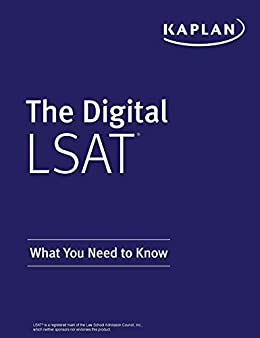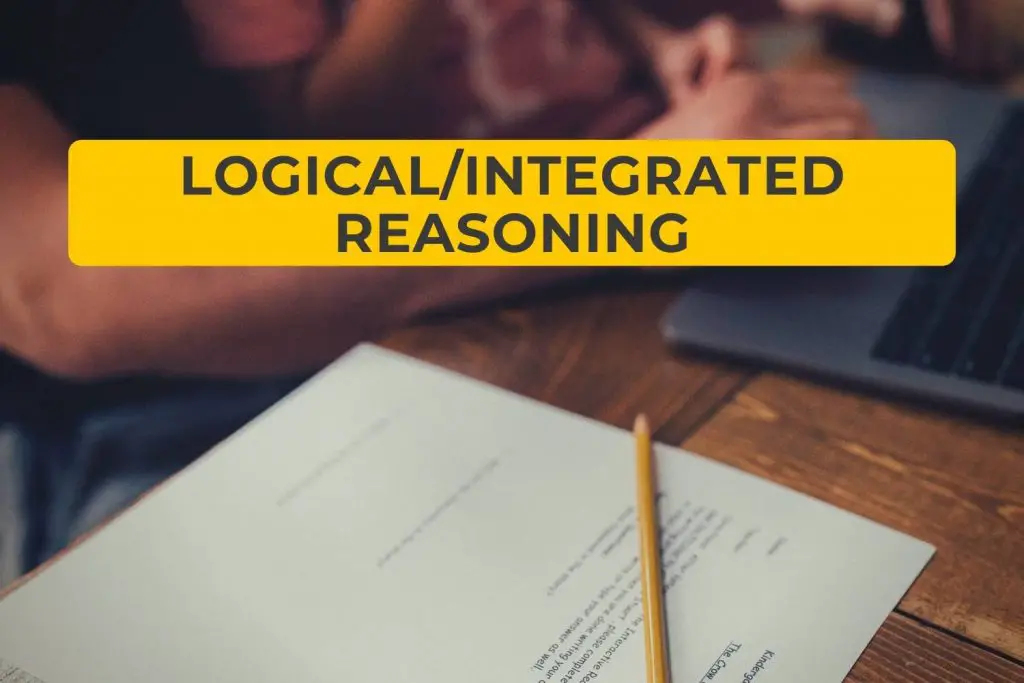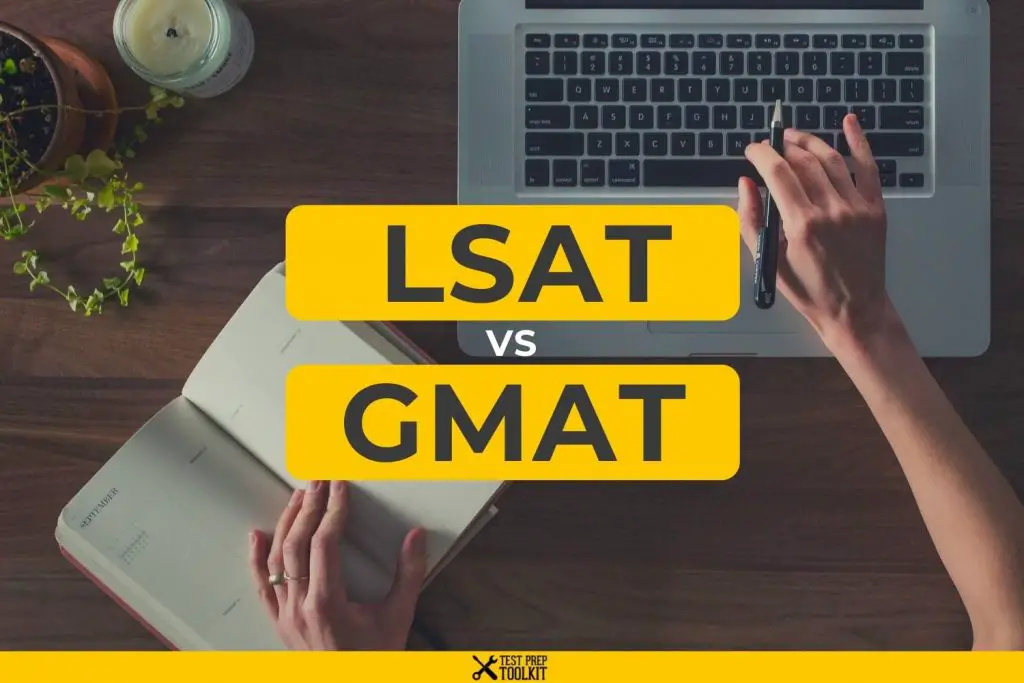LSAT vs. GMAT | ||
Governing Body | Law School Admission Council (LSAC) | Graduate Management Admission Council (GMAC) |
How to Sign-Up | ||
When Offered | Twice a week in June, July, September, November, January, and March. August 29 LSAT Replaced by LSAT-Flex due to COVID-19 | Year-Round |
Where Offered | Testing Center LSAT-Flex | Testing Centers GMAT Online |
Fees | $200 | $200 |
Format | – Reading Comprehension (26 – 28 questions) – Logical Reasoning (two sections with 24-26 questions per section) – Analytical Reasoning “Logic Games” (24 questions broken into four “games”) – Writing Sample (not scored, but included in your LSAC law school report) | – Analytical Writing Assessment (AWA/Essay) (one question) – Integrated Reasoning (12 multi- part questions) – Quantitative Reasoning (31 questions) – Verbal Reasoning (36 questions) |
Exam Length | 101 Questions 3 hours and 30 minutes | 78 Questions 2 hours and 45 minutes |
Score Range | 120 – 180 | 200 – 800 |
Average Score to Get into Top 20 Law/Business School | 168.5 | 710 |
Best Course To Begin |


So, the decision of which exam you should take is pretty straightforward. If you want to get your J.D., and practice law, you will have to ace the LSAT. If you want to get into an MBA program and succeed in the business world, you will have to crush the GMAT. To muddy the waters a bit, many law schools are now accepting the LSAT, GMAT, or GRE. The Graduate Record Examinations (GRE) is the standardized test that is required to get into grad school. Just check which admissions exam your target schools accept and plan accordingly.
So, if you are in the fence about which profession to pursue and want to know the differences between the LSAT and GMAT, this article has got you covered. We’ll outline the differences between each exam and then let you know which test is harder (for what it’s worth). In the end, we may not have made your mind up for you and which career to choose, but at least you will be armed with what each exam covers. That way you’ll know the best way to prep in your quest to crush the GMAT and LSAT.
The LSAT vs. GMAT at a Glance
Law School Admission Test (LSAT)
What’s the LSAT?
Great question! The Law School Admission Test (LSAT) is the exam you have to take if you want to apply to law schools in the U.S. or Canada. It’s administered by LSAC (the Law School Admission Council) and is created to measure your reading and verbal reasoning skills. Basically, it tests to see if you can read critically and think logically.
How do I sign up for the LSAT?
You have to register online to take the LSAT, and the fee in the U.S. is $200. The LSAT is given four times a year; twice a week in June, July, September, November, January, and March on Wednesdays and Saturdays. Due to COVID-19, the LSAT schedule has changed and is presently being given online using the LSAT-Flex. You can take the LSAT at a testing center or online via LSAT-Flex.
What’s on the LSAT?

The LSAT has 101 questions, and you’ll have 3 hours and 30 minutes to complete it. It’s administered in two parts. The first part is five 35-minute sections of multiple-choice questions. Four of the five sections make up your score. The unscored section is used to pretest new questions or to evaluate new test forms.
The scored sections of the LSAT are:
- Reading Comprehension (26 – 28 questions)
- Logical Reasoning (two sections with 24-26 questions per section)
- Analytical Reasoning (24 questions broken into four “games”)
You’ll also have to provide a writing sample (one essay question) that is not scored but is included in your law school report. It’s reviewed (maybe) by the law schools that you apply to.
Graduate Management Admission Test (GMAT)
What’s the GMAT?
Basically, the Graduate Management Admission Test or GMAT is the “MBA test.” It’s part of your application process to get into business school. The GMAT is created and administered by the Graduate Management Admission Council (GMAC), who works with business schools and businesses to develop appropriate content for the test. So, if you are looking for a career in business or management, you’ll have to take the GMAT. Most students who sit for the GMAT are also looking to get their MBA.
How do I sign up for the GMAT?
You have to register online to take the GMAT, and the fee in the U.S. is $200. The GMAT is given almost year-round, so you have great flexibility when planning to take the GMAT. You can take the GMAT at a testing center or due to COVID-19, the GMAT is also administered and proctored online.
What’s on the GMAT?

The GMAT has 80 questions, and you have 2 hours and 45 minutes to complete it. There The GMAT is a Computer Adaptive Test (CAT). That means that the level of difficulty of the questions adapts to your skill level.
The GMAT has four sections:
- Analytical Writing Assessment (AWA/Essay) (one question, 30-minute time limit)
- Integrated Reasoning (12 multi-part questions, 30-minute time limit)
- Quantitative Reasoning (31 questions, 62-minute time limit)
- Verbal Reasoning (36 questions, 65-minute time limit)
What’s the Difference between the GMAT and LSAT?
The tests themselves are quite different and test different types of critical thinking, reading, and math skills. You have to prepare differently for each exam. You could do well on one test and not so well on the other.
Reading Comprehension

LSAT
The Reading Comprehension section usually has between 26 and 28 questions and is 25% of your LSAT score. It is divided into three long (400-500 words) passages, each with their own set of questions. Then, there is one pair of passages that share a single question set between them.
GMAT
The GMAT has 3-4 reading passages (150 to 350 words), and each passage will have three or four questions devoted to it. That’s an average of 12 questions or about one-third of the Verbal section of the GMAT on reading comprehension.
Analytical/Quantitative

LSAT
The biggest difference between the LSAT and the GMAT is the math section (or lack thereof in the case of the LSAT). The LSAT has a math type section called Analytical Reasoning, commonly referred to as Logic Games. This section seems to be notorious among LSAT takers because it is so unlike any other standardized test question and is hard to study for. The section is made up of a number of “games.” Each game will revolve around a fairly common task and a set of rules limiting the ways in which the task can be performed. There will be a set of 5-7 associated questions, all of which will essentially ask you to determine various outcomes, both possible and impossible.
GMAT
The GMAT has a 75-minute Quantitative section, full of math—and no calculator! There is also a math-based Integrated Reasoning section. This involves interpreting various combinations of data because data are critical in the business world, but not so much in the legal world.
Logical/Integrated Reasoning

LSAT
The LSAT is principally a “verbal exam.” In addition to the Reading Comprehension section, it also has “Logical Reasoning” questions. They are similar to the GMAT Critical Reasoning type questions in the Verbal Reasoning section, but to many past test-takers, a little harder. In fact, those who took both tests would practice the GMAT’s questions and then move on to practicing the LSAT’s Logical Reasoning questions to really bone up for the GMAT.
GMAT
The Integrated Reasoning section of the GMAT exam measures how well you integrate data to figure out complex problems. Most top business schools who want to develop the business leaders of tomorrow, they want to hone one of the most essential business skills, your ability to take in huge chunks of data and make smart decisions.
Grammar
One section that the GMAT has that the LSAT does not, is Sentence Correction questions in the Verbal section. This tests your use of grammar and syntax. This is somewhat surprising because you would think that proper grammar would be relevant to a lawyer whose world is all verbal, but, for whatever reason, the LSAT does not test your grammar.
Writing Section

LSAT
Both the GMAT and LSAT have a writing section—one single essay. The LSAT essay is not graded and does not figure into your overall score. It is used as part of your Law School Report and schools that you apply to will have access to it. So, is your writing sample used in law school admissions? Not really. It will probably go unread. This exercise will probably not affect your admission chances at all.
GMAT
The GMAT has the Analytical Writing Assessment (AWA). This writing assignment measures your ability to think critically and communicate complex ideas in writing. The Analytical Writing section is graded on a scale of 0-6 in half-point increments but is not part of your overall GMAT score. The AWA is read by the admissions team at the business schools that you apply to. Most test-takers do well on the AWA, so the difference between a 5 and a 6 isn’t going to affect your application. However, if you get a 4 or below, it may send up a red flag.
The Importance of Personal Statements in Law School Admissions
While understanding the differences between the LSAT and GMAT is crucial, law school applicants must also focus on crafting compelling personal statements. Personal statements are a critical component of the law school application process. They allow you to showcase your unique experiences, motivations, and suitability for a legal career beyond what is reflected in your test scores and transcripts. A well-crafted personal statement can make a significant impact on admissions committees, highlighting your ability to think critically, communicate effectively, and present a coherent narrative about your career goals.
For those unsure about where to start or how to make their personal statement stand out, seeking professional guidance can be invaluable. Expert law school personal statement advising can help you refine your essay, ensuring it resonates with admissions officers and portrays you as a strong candidate.
Which is harder—LSAT or GMAT?

In the battle of heavyweights, who comes out on top as the harder exam? Well, it’s not as clear cut as you may think. Some nuances make one exam harder than the other—depending on what sections you are looking at. Here are the winners (not a winner for you if you struggle in a section) when it comes to test difficulty.
Reading Comprehension
The Winner: The LSAT. The LSAT passages are longer and deeper. You also have less time per question, and in general, the questions are more nuanced. If you are not a strong reader, then you may feel a bit threatened by the LSAT Reading Comprehension section.
LSAT Logical Reasoning v. GMAT Critical Reasoning
The Winner: The LSAT. The LSAT questions are longer, denser, and more difficult than the GMAT’s Critical Reasoning questions in the Verbal Reasoning section. You also get less time per question on the LSAT.
LSAT Analytical Reasoning vs. GMAT Quantitative Section
The Winner: The GMAT. The GMAT gets the nod in toughness due to the breadth of the material covered. Even though the LSAT Analytical Reasoning section tests similar skills like the GMAT quant section does, most non-math test-takers would rather work on the games instead of doing math. Plus, some test-takers find the Logic Games the easiest part of the LSAT. They only make up one-fourth of your LSAT score. The GMAT quant section, however, makes up half of your score. Some MBA programs put more emphasis on the quant section than the verbal.
Overall Toughness
The Winner: The GMAT. Without a doubt, the GMAT format is harder than the LSAT format. Also, the GMAT will challenge you more mentally with the quantitative section and the many different types of questions. The LSAT basically has one question type.
What’s the best way to prepare for the LSAT or GMAT

Just like the SAT or ACT, you will need to prepare for these admissions tests if you want to get into a Top 20 school. You can try to prep on your own, buy a prep book from a store, or enroll in an online test prep course.
If you decide to go with on an online prep course, here are some things you should consider before you enroll:
- Don’t always choose a course just because it’s highly rated.
- It’s only is useful if it works for you.
- Choose the prep course that fits your learning style, study habits, schedule, and budget. You’ll need a program that effectively uses your study time.
- If the course doesn’t have the features that you need to learn effectively, then it’s a waste of your time and money.
- Make good use of the free trial that comes with many of the prep courses. This is the best way to see if the program is the right fit for you.
How do you know the best prep course for you? Start by reading our reviews of the Best LSAT Prep Course or the Best GMAT Prep Courses.
Conclusion
Unless you are undecided on your career path or are applying to a joint JD/MBA program, you won’t have to choose one over the other. If you have a dream of becoming a lawyer, then the LSAT is the test you will take. If you dream of becoming the future CEO of a Fortune 500 Company, then a high score on the GMAT will get you into a Top-20 Business School. Just note that many law schools are moving to accept the GMAT or GRE for admission.
There are obvious similarities and differences between the LSAT and the GMAT. The GMAT has a more math-focused exam, where the LSAT is mostly verbal. Once you have decided to sit for one of these tests, it is wise to consider enrolling in an online test prep course to help you crush the LSAT or the GMAT.










